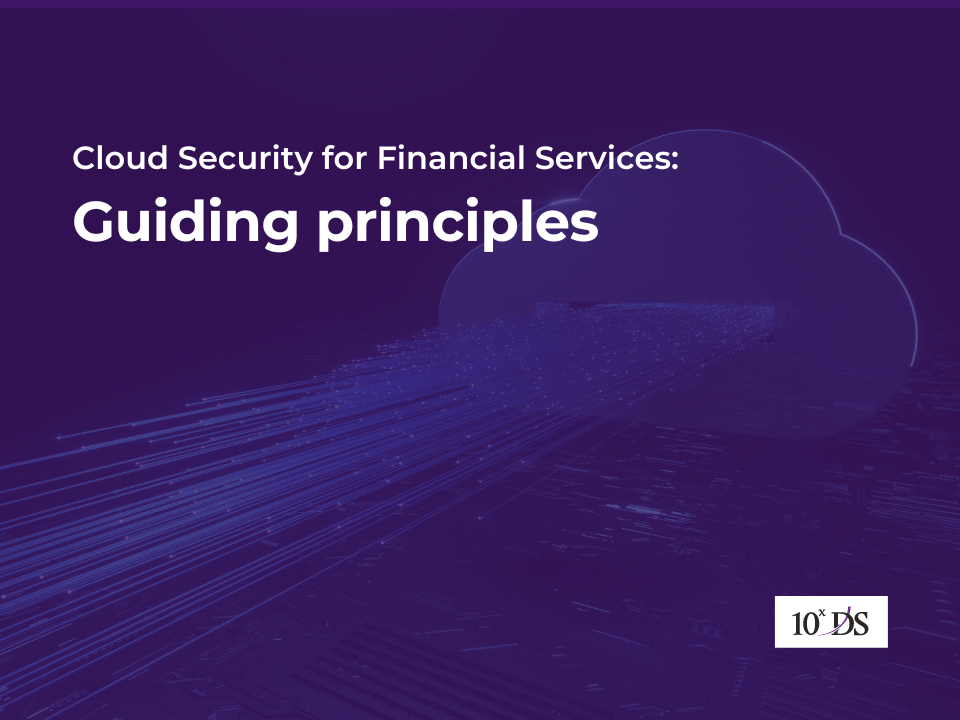
Cloud Security for Financial Services: Guiding Principles
Statistics suggest that most financial services companies are using the public cloud in some form. As organizations move toward digital transformation and incorporate cloud tools and services, ensuring robust security becomes crucial. Cloud security encompasses a set of procedures and technologies designed to safeguard data, applications, and infrastructure services in cloud-based environments. It addresses both external and internal threats to business security. It involves protecting data across networks, handling unique cybersecurity concerns related to multiple cloud service providers, and controlling user, device, and software access.
Before diving into cloud security, let’s understand cloud computing. It refers to accessing resources, software, and databases over the internet, beyond the limitations of local hardware. Common cloud computing services include:
- IaaS (Infrastructure-as-a-Service): Allows organizations to manage some data and applications on-premises while relying on cloud providers for server management, networking, and storage.
- PaaS (Platform-as-a-Service): Streamlines application development by providing an application framework that automates OS management, software updates, and infrastructure in the cloud.
- SaaS (Software-as-a-Service): Offers cloud-based software hosted online, available through subscriptions, with third-party providers managing technical aspects like data, middleware, and servers.
As enterprises embrace digital transformation, they face challenges in balancing productivity and security. Transitioning primarily to cloud-based environments requires secure practices. Cloud technologies offer flexibility and scalability, but securing them is essential to prevent data breaches and maintain trust. Organizations must deploy the best cloud security practices to reap the benefits of interconnected cloud technologies while safeguarding their data and operations.
Cloud Security for Financial Services
Sensitive Data Protection
Financial institutions deal with highly sensitive data—customer information, financial transactions, and proprietary business details. Protecting such confidential information including personal identification details, account numbers, financial transactions, and other sensitive data from unauthorized access, theft, or misuse involves implementing comprehensive measures. This entails employing robust encryption protocols, access controls, multi-factor authentication, and regular security audits to mitigate risks. By adopting a multi-layered approach to security, including advanced technologies like AI-driven threat detection and response systems, financial institutions can effectively uphold the integrity of their operations. Utilizing robust encryption techniques to protect data both at rest and in transit, implementing access controls and identity management mechanisms to ensure that only authorized individuals can access sensitive data, and regularly monitoring and auditing cloud environments for potential security threats or vulnerabilities is much needed.
Compliance and Regulations
Financial Services need to adhere to a complex web of legal requirements and industry standards to ensure the secure handling of sensitive financial data within cloud computing environments. This encompasses compliance with regulations such as GDPR, PCI DSS, SOC 2, and others, which dictate specific security measures and controls for protecting financial information. Companies must also consider jurisdictional regulations that may impact data sovereignty and cross-border data transfers when utilizing cloud services. Moreover, implementing robust security practices aligned with frameworks like the Cloud Security Alliance (CSA) guidelines and ISO/IEC 27017 standard is crucial for demonstrating compliance and mitigating risks associated with cloud-based data storage and processing. By proactively addressing compliance requirements and aligning cloud security strategies with relevant regulations, financial institutions can uphold trust with customers, mitigate legal risks, and safeguard sensitive financial data effectively.
Risk Mitigation
Financial services face significant risks related to data loss, operational disruptions, and reputational damage. Cloud security measures reduce these risks by providing redundancy, disaster recovery, and continuous monitoring. leveraging cloud service providers with strong security protocols and compliance certifications can help mitigate risks by offloading some security responsibilities while ensuring adherence to industry standards. Regular security audits, penetration testing, and incident response planning are also essential components of risk mitigation strategies, enabling financial institutions to proactively identify and remediate security gaps before they escalate into major breaches.
Cost Efficiency
By utilizing cloud-based security solutions, financial institutions can benefit from economies of scale, paying only for the resources and services they consume while avoiding the costs of maintaining and upgrading on-premises security infrastructure. Additionally, cloud-based security solutions often offer scalability, allowing financial services to adapt to changing needs and demand without incurring excessive costs associated with over-provisioning. Moreover, cloud security solutions may streamline compliance efforts by providing built-in tools and features to meet regulatory requirements, further enhancing cost efficiency by reducing the resources needed for compliance management. Overall, embracing cloud security solutions can help financial services achieve cost efficiencies by optimizing resource utilization, reducing overhead costs, and enhancing operational flexibility.
Business Continuity
Leveraging cloud-based solutions allows financial institutions to replicate data across geographically dispersed data centers, providing redundancy and resilience against localized outages or infrastructure failures. Additionally, cloud platforms offer built-in disaster recovery capabilities, enabling rapid data restoration and service restoration in the event of unforeseen incidents. By integrating cloud-based backup and recovery solutions, financial services can minimize downtime, maintain operational continuity, and mitigate financial losses associated with service disruptions or data loss. Moreover, regular testing and refinement of cloud-based disaster recovery plans are essential to ensuring their effectiveness and responsiveness during real-world scenarios, thereby enhancing overall business resilience and continuity in the face of evolving threats and challenges.
Secure Collaboration
Cloud-based collaboration tools enable secure file sharing, real-time communication, and collaborative document editing, allowing teams to collaborate effectively regardless of their physical location. Implementing robust encryption, access controls, and identity management mechanisms ensures that only authorized individuals can access and interact with confidential data and documents. Additionally, integrating multi-factor authentication and data loss prevention measures helps prevent unauthorized access and leakage of sensitive information. By leveraging cloud security solutions for collaboration, financial services can enhance productivity, foster collaboration, and maintain data confidentiality and integrity, thereby facilitating seamless and secure interactions across the organization and with external stakeholders.
With the increasing adoption of cloud computing across the financial industry, driven by factors such as cost efficiency, scalability, and agility, the demand for robust cloud security solutions will only intensify. Financial institutions will likely continue to invest in advanced technologies such as artificial intelligence (AI) and machine learning (ML) to bolster threat detection and response capabilities, enabling proactive identification and mitigation of security risks. Additionally, the convergence of cloud security with other emerging technologies like blockchain and quantum computing will present both opportunities and challenges for securing financial data and transactions. As regulatory requirements evolve, and cyber threats become more sophisticated, financial services organizations will need to prioritize cybersecurity investments and foster partnerships with trusted cloud service providers to stay ahead of emerging threats and ensure the resilience and integrity of their cloud environments. Overall, the future of cloud security in financial services will be characterized by continuous innovation, collaboration, and adaptation to the evolving threat landscape and regulatory landscape.
Talk to our experts to learn more.


